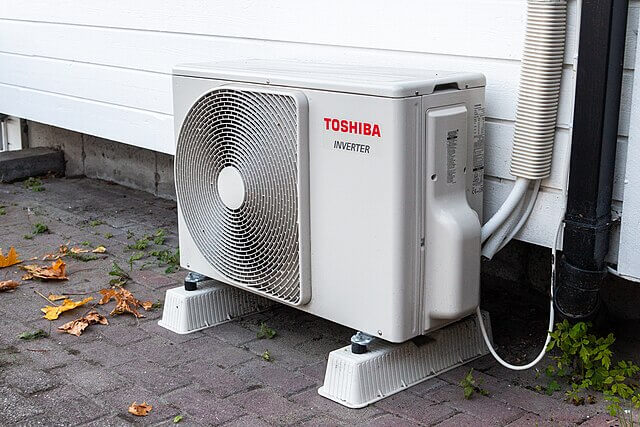
Graham Hendra reminisces about his initial foray into heat pumps about 15 years ago, noting their tepid performance compared to today’s standards.
“To get 50C – that was quite hard,” says the former wholesaler, referring to the temperature of the water that these devices sent to radiators, known as the flow temperature.
Back then, gas combi boilers dominated with flow temperatures typically hovering around 50-60°C.
The older heat pumps faced challenges in adequately heating homes unless homeowners opted for larger radiators, enhancing heat transfer into rooms.
However, a transformative shift has occurred in heat pump technology. Engineers have steadily advanced the technology, enabling heat pumps to deliver significantly higher temperatures, sometimes surpassing 70°C.
A pivotal development has been the adoption of new refrigerants like R290, or propane. This environmentally friendlier fluid circulates within the heat pump, capturing warmth from the external air, even on chilly days.
By compressing the slightly warmed refrigerant, the heat pump elevates the temperature and channels the heat into properties.
R290 boasts enhanced environmental credentials and efficiency, up to 34% more than older refrigerants, mitigating climate change risks and facilitating the delivery of higher temperatures with minimal efficiency losses.
Hendra, now technical director at Genous, emphasises that concerns regarding heat pump performance are increasingly becoming obsolete with these advancements.
“We have a thing in our industry that I call ‘temperature anxiety’,” he says, likening it to the “range anxiety” that some consumers have about electric cars.
However, convincing skeptics may take time.
Paul Ciniglio, head of whole-home retrofit at the National Energy Foundation, is overseeing a project in Bicester encompassing over 500 homes.
“We’re trying to get as many as a quarter of them to sign up to heat pumps but it’s proving really hard going,” he says. “There has been so much negative press.”
Some residents are sceptical the heat pumps will be hot enough, he explains, adding, “With the advent of this new refrigerant, it could be a game-changer.”
Vattenfall’s heat pump, employing R744 (CO2), achieves even higher temperatures, up to 85°C, with plans to install 300 units across Europe.
Daikin, too, plans to debut R290-based heat pumps in 2024. Energy Systems Catapult has conducted extensive testing on heat pumps, including R290 models, across various housing types since 2020.
These pumps consistently achieve a coefficient of performance (COP) of around 3, indicating favourable heat energy production relative to electricity consumption.
In principle, homeowners could change their heating system over with little fuss, says Alex Schoch, head of flexibility. “Combi boiler out, heat pump in,” as he puts it. This could make heat pumps viable in a broader range of UK homes, which are notoriously poorly insulated.
Daniel Logue, consultant, says that the R290 heat pumps included in the trial have performed well. “When averaged over the course of a year, the R290 high-temperature heat pumps were performing significantly better than the R410A heat pumps, which is a refrigerant that’s being phased out now,” he explains.
However, R290-based heat pumps have limitations, such as the need to avoid locating them near air bricks or ground-level windows due to the flammability risk posed by the refrigerant.
Sue Beesley, a homeowner in Cheshire, opted for an R290 heat pump installation, choosing to upgrade her radiators and limit flow temperatures to 45°C.
That means higher efficiency for her system overall. “What I’ve got now is a house with a very even temperature all the way through,” she says. The COP, in terms of her central heating, is staying near to 4, she adds.
Heat pump performance is not really a significant barrier to adoption in the UK, suggests Mari Martiskainen, director of the Energy Demand Research Centre at University of Sussex Business School: “We have supply chain issues, we have skills issues.”
Despite advancements, the adoption of heat pumps in the UK remains below government targets, with approximately 72,000 installations last year.
Hendra advocates for a broader range of heat pumps and continued technological improvements to encourage homeowners to transition away from fossil fuel-based boilers—a shift he believes is long overdue.
“We are appalling at heat pumps in the UK,” he says, pointing out that the UK was recently ranked 20th out of 21 European nations. “Which is truly embarrassing.”
——————————————————————————
At Natural World Fund, we are passionate about stopping the decline in our wildlife.
The decline in our wildlife is shocking and frightening. Without much more support, many of the animals we know and love will continue in their decline towards extinction.
When you help to restore a patch of degraded land through rewilding to forests, meadows, or wetlands, you have a massive impact on the biodiversity at a local level. You give animals a home and food that they otherwise would not have had, and it has a positive snowball effect on the food chain.
We are convinced that this is much better for the UK than growing lots of fast-growing coniferous trees, solely to remove carbon, that don’t actually help our animals to thrive.
This is why we stand for restoring nature in the UK through responsible rewilding. For us, it is the right thing to do. Let’s do what’s right for nature!
Donate today at https://naturalworldfund.com/ and join in the solution!

